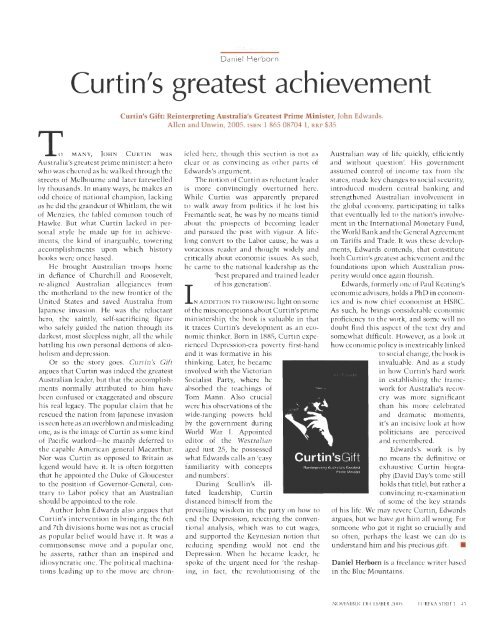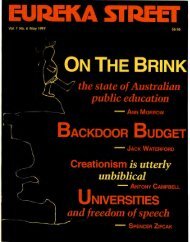0 - Eureka Street
0 - Eureka Street
0 - Eureka Street
Create successful ePaper yourself
Turn your PDF publications into a flip-book with our unique Google optimized e-Paper software.
ooks:~<br />
Daniel Herborn<br />
Curtin's greatest achievement<br />
Curtin's Gift: Reinterpreting Australia's Greatest Prime Minister, John Edwards.<br />
Allen and Unwin, 2005. ISBN 1 865 08704 1, RRP $35<br />
MANY, JOHN CURTIN was<br />
Australia's greatest prime minister: a hero<br />
who was cheered as he walked through the<br />
streets of Melbourne and later farewelled<br />
by thousands. In many ways, he makes an<br />
odd choice of national champion, lacking<br />
as he did the grandeur of Whitlam, the wit<br />
of Menzies, the fabled common touch of<br />
Hawke. But what Curtin lacked in personal<br />
style he made up for in achievements,<br />
the kind of inarguable, towering<br />
accomplishments upon which history<br />
books were once based.<br />
He brought Australian troops home<br />
in defiance of Churchill and Roosevelt,<br />
re-aligned Australian allegiances from<br />
the motherland to the new frontier of the<br />
United States and saved Australia from<br />
Japanese invasion. He was the reluctant<br />
hero, the saintly, self-sacrificing figure<br />
who safely guided the nation through its<br />
darkest, most sleepless night, all the while<br />
battling his own personal demons of alcoholism<br />
and depression.<br />
Or so the story goes. Curtin's Gift<br />
argues that Curtin was indeed the greatest<br />
Australian leader, but that the accomplishments<br />
normally attributed to him have<br />
been confused or exaggerated and obscure<br />
his real legacy. The popular claim that he<br />
rescued the nation from Japanese invasion<br />
is seen here as an overblown and misleading<br />
one, as is the image of Curtin as some kind<br />
of Pacific warlord- he m ainly deferred to<br />
the capable American general Macarthur.<br />
Nor was Curtin as opposed to Britain as<br />
legend would have it. It is often forgotten<br />
that he appointed the Duke of Gloucester<br />
to the position of Governor-General, contrary<br />
to Labor policy that an Australian<br />
should be appointed to the role.<br />
Author John Edwards also argues that<br />
Curtin's intervention in bringing the 6th<br />
and 7th divisions home was not as crucial<br />
as popular belief would have it. It was a<br />
commonsense move and a popular one,<br />
he asserts, rather than an inspired and<br />
idiosyncratic one. The political machinations<br />
leading up to the move are chronicled<br />
here, though this section is not as<br />
clear or as convincing as other parts of<br />
Edwards's argument.<br />
The notion of Curtin as reluctant leader<br />
is more convincingly overturned here.<br />
While Curtin was apparently prepared<br />
to walk away from politics if he lost his<br />
Fremantle seat, he was by no means timid<br />
about the prospects of becoming leader<br />
and pursued the post with vigour. A lifelong<br />
convert to the Labor cause, he was a<br />
voracious reader and thought widely and<br />
critically about economic issues. As such,<br />
he came to the national leadership as the<br />
'best prepared and trained leader<br />
of his generation'.<br />
I ADDITION TO THROW I G light on some<br />
of the misconceptions about Curtin's prime<br />
ministership, the book is valuable in that<br />
it traces Curtin's development as an economic<br />
thinker. Born in 1885, Curtin experienced<br />
Depression-era poverty fi rst-hand<br />
and it was formative in his<br />
thinking. Later, he became<br />
involved with the Victorian<br />
Socialist Party, where he<br />
absorbed the teachings of<br />
Tom Mann. Also crucial<br />
were his observations of the<br />
wide-ranging powers held<br />
by the government during<br />
World War I. Appointed<br />
editor of the Westralian<br />
aged just 25, he possessed<br />
what Edwards calls an 'easy<br />
familiarity with concepts<br />
and numbers'.<br />
During Scullin's illfated<br />
leadership, Curtin<br />
distanced himself from the<br />
prevailing wisdom in the party on how to<br />
end the Depression, rejecting the conventional<br />
analysis, which was to cut wages,<br />
and supported the Keynesian notion that<br />
reducing spending would not end the<br />
Depression . When he became leader, he<br />
spoke of the urgent need for 'the reshaping,<br />
in fact, the revolutionising of the<br />
Australian way of life quickly, efficiently<br />
and without question'. His government<br />
assumed control of income tax fro m the<br />
states, made key changes to social security,<br />
introduced modern central banking and<br />
strengthened Australian involvement in<br />
the global economy, participating in talks<br />
that eventually led to the nation's involvement<br />
in the International Monetary Fund,<br />
the World Bank and the General Agreement<br />
on Tariffs and Trade. It was these developments,<br />
Edwards contends, that constitute<br />
both Curtin's greatest achievement and the<br />
foundations upon which Australian prosperity<br />
would once again flourish.<br />
Edwards, formerly one of Paul Keating's<br />
economic advisers, holds a PhD in economics<br />
and is now chief economist at HSBC.<br />
As such, he brings considerable economic<br />
proficiency to the work, and some will no<br />
doubt find this aspect of the text dry and<br />
somewhat difficult. However, as a look at<br />
how economic policy is inextricably linked<br />
to social change, the book is<br />
invaluable. And as a study<br />
in how Curtin's hard work<br />
in establishing the framework<br />
for Australia's recovery<br />
was more significa nt<br />
than his more celebrated<br />
and dra matic moments,<br />
it's an incisive look at how<br />
politicians are perceived<br />
and remembered.<br />
Edwards's work is by<br />
no means the definitive or<br />
exhaustive Curtin biography<br />
(David Day's tome still<br />
holds that titleL but rather a<br />
convincing re-examination<br />
of some of the key stra nds<br />
of his life. We may revere Curtin, Edwards<br />
argues, but we have got him all wrong. For<br />
someone who got it right so crucially and<br />
so often, perhaps the least we can do is<br />
understand him and his precious gift. •<br />
Daniel Herborn is a freelance writer based<br />
in the Blue Mountains.<br />
OVEMBER- DECEMBER 2005 EUREKA STREET 45
















